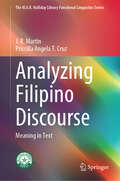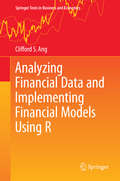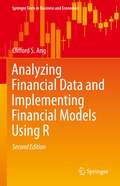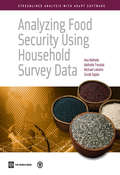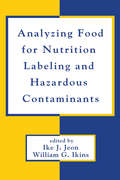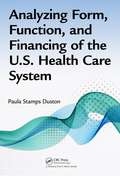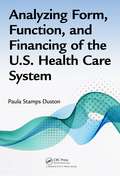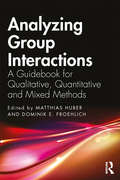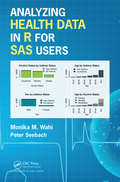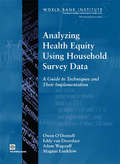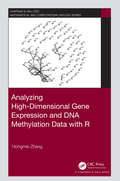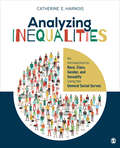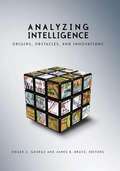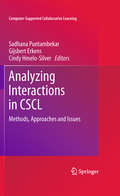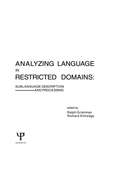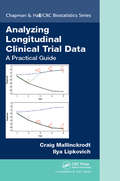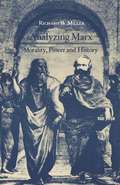- Table View
- List View
Analyzing Evolutionary Algorithms: The Computer Science Perspective (Natural Computing Series)
by Thomas JansenEvolutionary algorithms is a class of randomized heuristics inspired by natural evolution. They are applied in many different contexts, in particular in optimization, and analysis of such algorithms has seen tremendous advances in recent years. In this book the author provides an introduction to the methods used to analyze evolutionary algorithms and other randomized search heuristics. He starts with an algorithmic and modular perspective and gives guidelines for the design of evolutionary algorithms. He then places the approach in the broader research context with a chapter on theoretical perspectives. By adopting a complexity-theoretical perspective, he derives general limitations for black-box optimization, yielding lower bounds on the performance of evolutionary algorithms, and then develops general methods for deriving upper and lower bounds step by step. This main part is followed by a chapter covering practical applications of these methods. The notational and mathematical basics are covered in an appendix, the results presented are derived in detail, and each chapter ends with detailed comments and pointers to further reading. So the book is a useful reference for both graduate students and researchers engaged with the theoretical analysis of such algorithms.
Analyzing Filipino Discourse: Meaning in Text (The M.A.K. Halliday Library Functional Linguistics Series)
by J. R. Martin Priscilla Angela CruzThis book explores Filipino, the national language of the Philippines, from the perspectives of Critical Discourse Analysis (CDA) and Positive Discourse Analysis (PDA)—informed by Systemic Functional Linguistics (SFL). It is designed to encourage researchers to study Filipino texts—both spoken and written—and to unpack them in a way that clarifies their function in Philippine society. With this goal in mind, the book introduces a number of discourse analysis tools and shows how to apply them to a range of Filipino texts—including a children's picture book story, some mental health advice about coping with COVID-19, President Duterte's speech about the Philippine government's initial response to the COVID-19 pandemic, a comment piece from a student newspaper about problems with online learning modules produced by the Department of Education, and a reflective text about growing up in Davao. This is the first book to draw on a range of functional linguistic tools to analyse Filipino discourse in order to provide deeper insights into the role of language in bilingual education, the linguistic enactment of power, and the importance of thinking across languages when analysing texts. Key issues addressed include the complementarity of CDA and PDA, SFL's model of social context (as register and genre), analysing bilingual texts and bilingual education. The book fosters appliable linguistics as a dialectic of theory, description, and practice—supporting Filipino discourse analysts as they engage with the challenge of giving people access to a range of tools they can use productively to mean and thereby more successfully pursue their social goals. As such, it provides a model for researchers of other languages of how to encourage the analysis of meaning in texts within and beyond the clause. It is relevant to scholars across the spectrum of linguistics, particularly those working in Systemic Functional Linguistics.
Analyzing Financial Data and Implementing Financial Models Using R (Springer Texts in Business and Economics)
by Clifford S. AngThis book is a comprehensive introduction to financial modeling that teaches advanced undergraduate and graduate students in finance and economics how to use R to analyze financial data and implement financial models. This text will show students how to obtain publicly available data, manipulate such data, implement the models, and generate typical output expected for a particular analysis. This text aims to overcome several common obstacles in teaching financial modeling. First, most texts do not provide students with enough information to allow them to implement models from start to finish. In this book, we walk through each step in relatively more detail and show intermediate R output to help students make sure they are implementing the analyses correctly. Second, most books deal with sanitized or clean data that have been organized to suit a particular analysis. Consequently, many students do not know how to deal with real-world data or know how to apply simple data manipulation techniques to get the real-world data into a usable form. This book will expose students to the notion of data checking and make them aware of problems that exist when using real-world data. Third, most classes or texts use expensive commercial software or toolboxes. In this text, we use R to analyze financial data and implement models. R and the accompanying packages used in the text are freely available; therefore, any code or models we implement do not require any additional expenditure on the part of the student. Demonstrating rigorous techniques applied to real-world data, this text covers a wide spectrum of timely and practical issues in financial modeling, including return and risk measurement, portfolio management, options pricing, and fixed income analysis.
Analyzing Financial Data and Implementing Financial Models Using R (Springer Texts in Business and Economics)
by Clifford S. AngThis advanced undergraduate/graduate textbook teaches students in finance and economics how to use R to analyse financial data and implement financial models. It demonstrates how to take publically available data and manipulate, implement models and generate outputs typical for particular analyses. A wide spectrum of timely and practical issues in financial modelling are covered including return and risk measurement, portfolio management, option pricing and fixed income analysis. This new edition updates and expands upon the existing material providing updated examples and new chapters on equities, simulation and trading strategies, including machine learnings techniques. Select data sets are available online.
Analyzing Fiscal Space Using the MAMS Model: An Application to Burkina Faso
by Jan Gottschalk Vu Manh Le Hans Lofgren Kofi NouveA report from the International Monetary Fund.
Analyzing Food Security Using Household Survey Data
by Zurab Sajaia Michael Lokshin Nathalie Troubat Ana MoltedoSince the end of the Second World War, the international community has been focusing on reducing the number and the proportion of people who suffer from hunger. Over time it became clear that no single indicator would provide a comprehensive picture of the food security situation. Rather, a suite of indicators is necessary to describe food insecurity in all its dimensions. The demand for evidence-based policies, which brings together providers such as statistical offices and users of food security indicators including policy makers and researchers, has also been increasing. The stand-alone software, ADePT-Food Security Module (available for free downloading), was developed to produce food security indicators from food consumption data collected in household surveys. These indicators, derived at the national and subnational levels, include the consumption of calories and macronutrients, the availability of micronutrients and amino acids, the distribution of calories and the proportion of people undernourished. The book focuses on the theory, methodology, and analysis of these indicators. It has five chapters beginning with a brief overview on concepts of food security. The theory and methodology are further described in the following chapter. To help users with the interpretation of the results some examples are given in chapter 3. Chapter 4 of the book provides guidelines for the preparation of the input datasets. Finally, chapter 5 explains how to use the software. Both the software and this book are products of decades of experience in analyzing food security. This project was made possible through collaboration between FAO and the World Bank, with financial support from the European Union.
Analyzing Food for Nutrition Labeling and Hazardous Contaminants
by Ike J. Jeon William G. IkinsThis work provides up-to-date information on the various analytical procedures involved in both nutrition labelling and the identification and quantitation of hazardous chemicals in foods. It assesses the relative strengths of traditional and modern analysis techniques. The book covers all mandatory dietary components and many optional nutritients specified by the new labelling regulations of the Food and Drug Administration and the US Department of Agriculture Food Safety and Inspection Service.
Analyzing Form, Function, and Financing of the U.S. Health Care System
by Paula Stamps DustonAnalyzing Form, Function, and Financing of the U.S. Health Care System tells the story of the U.S. health care system by using a narrative approach identifying function rather than the more common data-driven focus on structure. It presents policy decisions we have made about our health care system and analyzes some of their consequences to better understand the choices we have. To facilitate this, the book is divided into four major sections. <p><p> Section I is mostly "about" the health care system. It describes several theoretical models that provide a foundation for the structure of the U.S. health care system. Section II provides a description of the form, or organization, of the U.S. health care delivery system. It presents a comprehensive overview of the entire health care delivery system, including identifying all levels of care. <p> Section III focuses on financing, beginning with a description of the economic and political values that determine how we finance our system. It describes health insurance, from the perspective of both the consumer and the provider, and discusses how money moves through the system. It concludes with a discussion and analysis of cost and cost control efforts. <p> Section IV describes some of the more important efforts in health care reform, including several targeted programs that are a significant part of the U.S. health care system, such as Medicare and Medicaid. It also describes other targeted programs within the U.S. health care system and explores how other countries with economies similar to that of the United States organize and finance their health care systems.
Analyzing Form, Function, and Financing of the U.S. Health Care System
by Paula Stamps DustonAnalyzing Form, Function, and Financing of the U.S. Health Care System tells the story of the U.S. health care system by using a narrative approach identifying function rather than the more common data-driven focus on structure. It presents policy decisions we have made about our health care system and analyzes some of their consequences to better
Analyzing Friction in the Design of Rubber Products and Their Paired Surfaces
by Robert Horigan SmithTaking a mechanistic approach that emphasizes the physical behavior of rubber as it slides, Analyzing Friction in the Design of Rubber Products and Their Paired Surfaces integrates the engineering and scientific evidence demonstrating that the laws of metallic friction do not apply to rubber. The book also presents a newly developed, scienti
Analyzing Global Environmental Issues: Theoretical and Experimental Applications and their Policy Implications (Routledge Explorations in Environmental Economics #39)
by Ariel Dinar Amnon RapoportThe existence of environmental dilemmas and political conflicts leads us to appreciate the need for individuals and groups to behave strategically in order to achieve their goals and maintain their wellbeing. Global issues such as climate change, resource depletion, and pollution, as well as revolts and protests against corporations, regimes, and other central authorities, are the result of increased levels of externalities among individuals and nations. These all require policy intervention at international and global levels. This book includes chapters by experts proposing game theoretical solutions and applying experimental design to a variety of social issues related to global and international conflicts over natural resources and the environment. The focus of the book is on applications that have policy implications, relevance and, consequently, could lead to the establishment of policy dialogue. The chapters in the book address issues that are global in nature, such as international environmental agreements over climate change, international water management, common pool resources, public goods, international fisheries, international trade, and collective action, protest, and revolt. The book’s main objective is to illustrate the usefulness of game theory and experimental economics in policy making at multiple levels and for various aspects related to global and international issues. The subject area of this book is already widely taught and researched, but it continues to gain popularity, given growing recognition that the environment and natural resources have become more strategic in human behavior.
Analyzing Group Interactions: A Guidebook for Qualitative, Quantitative and Mixed Methods
by Matthias Huber Dominik E. FroehlichAnalyzing Group Interactions gives a comprehensive overview of the use of different methods for the analysis of group interactions. International experts from a range of different disciplines within the social sciences illustrate their step-by-step procedures of how they analyze interactions within groups and explain what kind of data and skills are needed to get started. Each method is discussed in the same, structured manner, focusing on each method’s strengths and weaknesses, its applicability and requirements, and the precise workflow to "follow along" when analyzing group interactions with the respective method. The analyzing strategies covered in this book include ethnographical approaches, phenomenology, content analysis, documentary method, discourse analysis, grounded theory, social network analysis, quantitative ratings, and several triangulative and mixed-method research designs. This volume is recommended for researchers at all levels that need guidance with the complex task of analyzing group interactions. The unified structure throughout the book facilitates comparison across the different methods and helps with deciding on the approach to be taken.
Analyzing Health Data in R for SAS Users
by Monika Maya Wahi Peter SeebachAnalyzing Health Data in R for SAS Users is aimed at helping health data analysts who use SAS accomplish some of the same tasks in R. It is targeted to public health students and professionals who have a background in biostatistics and SAS software, but are new to R. For professors, it is useful as a textbook for a descriptive or regression modeling class, as it uses a publicly-available dataset for examples, and provides exercises at the end of each chapter. For students and public health professionals, not only is it a gentle introduction to R, but it can serve as a guide to developing the results for a research report using R software. Features: Gives examples in both SAS and R Demonstrates descriptive statistics as well as linear and logistic regression Provides exercise questions and answers at the end of each chapter Uses examples from the publicly available dataset, Behavioral Risk Factor Surveillance System (BRFSS) 2014 data Guides the reader on producing a health analysis that could be published as a research report Gives an example of hypothesis-driven data analysis Provides examples of plots with a color insert
Analyzing Health Equity Using Household Survey Data: A Guide to Techniques and Their Implementation
by Owen O'Donnell Adam Wagstaff Magnus LindelowHave gaps in health outcomes between the poor and better off grown? Are they larger in one country than another? Are health sector subsidies more equally distributed in some countries than others? Are health care payments more progressive in one health care financing system than another? What are catastrophic payments and how can they be measured? How far do health care payments impoverish households? Answering questions such as these requires quantitative analysis. This in turn depends on a clear understanding of how to measure key variables in the analysis, such as health outcomes, health expenditures, need, and living standards. It also requires set quantitative methods for measuring inequality and inequity, progressivity, catastrophic expenditures, poverty impact, and so on. This book provides an overview of the key issues that arise in the measurement of health variables and living standards, outlines and explains essential tools and methods for distributional analysis, and, using worked examples, shows how these tools and methods can be applied in the health sector. The book seeks to provide the reader with both a solid grasp of the principles underpinning distributional analysis, while at the same time offering hands-on guidance on how to move from principles to practice.
Analyzing High-Dimensional Gene Expression and DNA Methylation Data with R (Chapman And Hall/crc Computational Biology Ser.)
by Hongmei ZhangAnalyzing high-dimensional gene expression and DNA methylation data with R is the first practical book that shows a ``pipeline" of analytical methods with concrete examples starting from raw gene expression and DNA methylation data at the genome scale. Methods on quality control, data pre-processing, data mining, and further assessments are presented in the book, and R programs based on simulated data and real data are included. Codes with example data are all reproducible. Features: • Provides a sequence of analytical tools for genome-scale gene expression data and DNA methylation data, starting from quality control and pre-processing of raw genome-scale data. • Organized by a parallel presentation with explanation on statistical methods and corresponding R packages/functions in quality control, pre-processing, and data analyses (e.g., clustering and networks). • Includes source codes with simulated and real data to reproduce the results. Readers are expected to gain the ability to independently analyze genome-scaled expression and methylation data and detect potential biomarkers. This book is ideal for students majoring in statistics, biostatistics, and bioinformatics and researchers with an interest in high dimensional genetic and epigenetic studies.
Analyzing Inequalities: An Introduction to Race, Class, Gender, and Sexuality Using the General Social Survey
by Catherine E. HarnoisAnalyzing Inequalities: An Introduction to Race, Class, Gender, and Sexuality Using the General Social Survey is a practical resource for helping students connect sociological issues with real-world data in the context of their first undergraduate sociology courses. This worktext introduces readers to the GSS, one of the most widely analyzed surveys in the U.S.; examines a range of GSS questions related to social inequalities; and demonstrates basic techniques for analyzing this data online. No special software is required–the exercises can be completed using the Survey Documentation and Analysis (SDA) website at the University of California-Berkeley which is easy to navigate and master. Students will come away with a better understanding of social science research, and will be better positioned to ask and answer the sociological questions that most interest them.
Analyzing Inequalities: An Introduction to Race, Class, Gender, and Sexuality Using the General Social Survey
by Catherine E. HarnoisAnalyzing Inequalities: An Introduction to Race, Class, Gender, and Sexuality Using the General Social Survey is a practical resource for helping students connect sociological issues with real-world data in the context of their first undergraduate sociology courses. This worktext introduces readers to the GSS, one of the most widely analyzed surveys in the U.S.; examines a range of GSS questions related to social inequalities; and demonstrates basic techniques for analyzing this data online. No special software is required–the exercises can be completed using the Survey Documentation and Analysis (SDA) website at the University of California-Berkeley which is easy to navigate and master. Students will come away with a better understanding of social science research, and will be better positioned to ask and answer the sociological questions that most interest them.
Analyzing Information on Women-Owned Small Businesses in Federal Contracting
by National Research Council of the National AcademiesThe National Academies Press (NAP)--publisher for the National Academies--publishes more than 200 books a year offering the most authoritative views, definitive information, and groundbreaking recommendations on a wide range of topics in science, engineering, and health. Our books are unique in that they are authored by the nation's leading experts in every scientific field.
Analyzing Intelligence: Origins, Obstacles, and Innovations
by Roger Z. George James B. BruceDrawing on the individual and collective experience of recognized intelligence experts and scholars in the field, Analyzing Intelligence provides the first comprehensive assessment of the state of intelligence analysis since 9/11. Its in-depth and balanced evaluation of more than fifty years of U. S. analysis includes a critique of why it has under-performed at times. It provides insights regarding the enduring obstacles as well as new challenges of analysis in the post-9/11 world, and suggests innovative ideas for improved analytical methods, training, and structured approaches. The book's six sections present a coherent plan for improving analysis. Early chapters examine how intelligence analysis has evolved since its origins in the mid-20th century, focusing on traditions, culture, successes, and failures. The middle sections examine how analysis supports the most senior national security and military policymakers and strategists, and how analysts must deal with the perennial challenges of collection, politicization, analytical bias, knowledge building and denial and deception. The final sections of the book propose new ways to address enduring issues in warning analysis, methodology (or "analytical tradecraft") and emerging analytic issues like homeland defense. The book suggests new forms of analytic collaboration in a global intelligence environment, and imperatives for the development of a new profession of intelligence analysis. Analyzing Intelligence is written for the national security expert who needs to understand the role of intelligence and its strengths and weaknesses. Practicing and future analysts will also find that its attention to the enduring challenges provides useful lessons-learned to guide their own efforts. The innovations section will provoke senior intelligence managers to consider major changes in the way analysis is currently organized and conducted, and the way that analysts are trained and perform.
Analyzing Interactions in CSCL: Methods, Approaches and Issues (Computer-Supported Collaborative Learning Series #12)
by Gijsbert Erkens Sadhana Puntambekar Cindy Hmelo-SilverAnalyzing Interactions in CSCL: Methodology, Approaches, and Issues deepens the understanding of ways to document and analyze interactions in CSCL and informs the design of the next generation of CSCL tools. It provides researchers with several alternative methodologies, theoretical underpinnings of the methods used, data indicating how the method worked, guidance for using the methods, implications for understanding collaborative processes and their effect on learning outcomes and implications for design. CSCL research tends to span across several disciplines such as education, psychology, computer science and artificial intelligence. As a result, the methods for data collection and analysis are interdisciplinary, from fields such as sociology, anthropology, psychology, computer science, and artificial intelligence. This book brings perspectives together, and provides researchers with an array of methodologies to document and analyze collaborative interactions.
Analyzing Language in Restricted Domains: Sublanguage Description and Processing
by Ralph Grishman and Richard KittredgeFirst published in 1986. Routledge is an imprint of Taylor & Francis, an informa company.
Analyzing Linguistic Data
by R. H. BaayenStatistical analysis is a useful skill for linguists and psycholinguists, allowing them to understand the quantitative structure of their data. This textbook provides a straightforward introduction to the statistical analysis of language. Designed for linguists with a non-mathematical background, it clearly introduces the basic principles and methods of statistical analysis, using 'R', the leading computational statistics programme. The reader is guided step-by-step through a range of real data sets, allowing them to analyse acoustic data, construct grammatical trees for a variety of languages, quantify register variation in corpus linguistics, and measure experimental data using state-of-the-art models. The visualization of data plays a key role, both in the initial stages of data exploration and later on when the reader is encouraged to criticize various models. Containing over 40 exercises with model answers, this book will be welcomed by all linguists wishing to learn more about working with and presenting quantitative data.
Analyzing Longitudinal Clinical Trial Data: A Practical Guide (Chapman & Hall/CRC Biostatistics Series)
by Craig Mallinckrodt Ilya LipkovichAnalyzing Longitudinal Clinical Trial Data: A Practical Guide provides practical and easy to implement approaches for bringing the latest theory on analysis of longitudinal clinical trial data into routine practice.The book, with its example-oriented approach that includes numerous SAS and R code fragments, is an essential resource for statisticians and graduate students specializing in medical research. The authors provide clear descriptions of the relevant statistical theory and illustrate practical considerations for modeling longitudinal data. Topics covered include choice of endpoint and statistical test; modeling means and the correlations between repeated measurements; accounting for covariates; modeling categorical data; model verification; methods for incomplete (missing) data that includes the latest developments in sensitivity analyses, along with approaches for and issues in choosing estimands; and means for preventing missing data. Each chapter stands alone in its coverage of a topic. The concluding chapters provide detailed advice on how to integrate these independent topics into an over-arching study development process and statistical analysis plan.
Analyzing Markov Chains using Kronecker Products: Theory and Applications (SpringerBriefs in Mathematics)
by Tugrul DayarKronecker products are used to define the underlying Markov chain (MC) in various modeling formalisms, including compositional Markovian models, hierarchical Markovian models, and stochastic process algebras. The motivation behind using a Kronecker structured representation rather than a flat one is to alleviate the storage requirements associated with the MC. With this approach, systems that are an order of magnitude larger can be analyzed on the same platform. The developments in the solution of such MCs are reviewed from an algebraic point of view and possible areas for further research are indicated with an emphasis on preprocessing using reordering, grouping, and lumping and numerical analysis using block iterative, preconditioned projection, multilevel, decompositional, and matrix analytic methods. Case studies from closed queueing networks and stochastic chemical kinetics are provided to motivate decompositional and matrix analytic methods, respectively.
Analyzing Marx: Morality, Power and History
by Richard W. MillerIn this book Marx is revealed as a powerful contributor to the debates that now dominate philosophy and political theory. Using the techniques of analytic philosophy to unite Marx's general statements with his practice as historian and activist, Richard W. Miller derives important arguments about the rational basis of morality, the nature of power, and the logic of testing and explanation. The book also makes Marx's theory of change useful for current social science, by replacing economic determinist readings with a new interpretation in which systems of power relations are the basis of change. Part One discusses Marx's criticisms of the moral point of view as a basis for social choice. The outlook that emerges is humane but antimoral. Part Two argues that Marx's concept of the ruling class is a means, of measuring political power that is ignored yet urgently needed by present-day social science. Part Three bases Marx's theory of history on the dynamics of power, challenging both the standard, economic determinist readings of the theory and standard conceptions of science.

